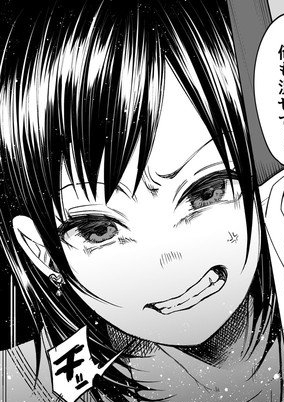I love English and was once good enough to become an English teacher at a Japanese junior high school. However, that was in the past and since then my knowledge of English has been declining rapidly. So, as part of my language learning, I decided to submit some simple questions and comments about English language that are not easy for me (and that I should ask on HiNative or Quora) to Newgrounds. I am not an expert in English and may be making elementary mistakes, but thank you for your patience.
Swear Words | English Is Not So Easy 3
"Bite me."
That the phrase could be meant as an insult is something I could imagine from what the three poor girls at Britain's Got Talent said to the booing audience and to Simon. However, the term still makes me think of Mavis from Hotel Transylvania.
English swear words are unique and difficult to translate into other languages. If someone says "Bite me" to me, it does not mean that they want me to bite them, nor does "fu-- you" mean that they want to have s-x with me.
Japanese translators have historically struggled with such words. I was reading The Catcher in the Rye by J. D. Salinger, translated into Japanese by a translator named Takashi Nozaki, when the strange word "オマンコシヨウ (lit. let's play with pu--y??)" caught my attention. The word was used only in this novel and not in any dictionary, but when I looked up the English original, I found that it was a translation of "F--K YOU".
Until now, the most common translation rule for English-specific swear words has been "do not translate directly and replace it with another swear word," but there are a few exceptions. As I wrote in the first article, there was an American filmmaker, Stanley Kubrick, who did not allow that policy. He consequently created the opportunity for a new vocabulary of swear words in Japan.
・そびえ立つクソ(stacked s--t)
・メス犬の息子(son of a b---h)
…
An unnamed Japanese person who used to provide Japanese subtitles for Angry Video Game Nerd's YouTube videos translated "mother f--ker" as "母犯し野郎," so I think he or she was influenced by "Full Metal Jacket".
Incidentally, in Japan today, more than 90% of words classified as "English-specific swear words" are translated as "くそったれ" meaning "(You) who shit yourself!" or "畜生" meaning "Beast!"
However, it is interesting to note that if it is a gesture rather than a swear word, its origin is a little easier to learn. For example, in the United States, the gesture of raising the middle finger is considered a very offensive sign because it signifies the male genitalia. Also, in England, the two-finger salute is considered an insult. This is because in the old days, brave Robin Hoods who handled bows and arrows appealed to the guards in prison, "Cut off my fingers if you can!"
Finally, I would like to talk about such words and gestures in Japan. Before that, let me tell you that the gesture introduced here is probably not something you need to be aware of if you do not live in the Japanese cultural sphere.
はぁ? ≒ Huh?:

(from "Usseewa(うっせぇわ)" by Ado)
This is no one's fault, but the pronunciation of the English "huh?" is similar to that of the Japanese "はぁ? (lit. WHAAAAT?!)" and this word, unfortunately, is a very offensive way of asking back. However, most Japanese know the English "huh?" so if you are a native English speaker and a learner of Japanese, there is little chance of being misunderstood.

(from "The Whispering Woman(囁く女)" by Junji Ito(伊藤潤二))
Instead, a common way for Japanese people to ask back is "え?≒ Eh?" This is rarely used in the U.S., but I have heard that it is commonly used in Canadian English, which is influenced by French. So, please ask back in Canadian English to Japanese people.
clicking your tongue:

(from "Kimi ni aisarete itakatta (君に愛されて痛かった)" by Shiruka bakaudon(知るかバカうどん))
In the past, there was a time when this gesture was used to express thinking about something or as a way of expressing mild praise, but today it is done only to express strong dissatisfaction or irritation. If you do this in Japan, people around you will think you are extremely angry.
making the hand bones sound:

(from "Hokuto no Ken(北斗の拳)" by Hara Tesuo(原哲夫) and Buronson(武論尊))
This indicates to others that "I'm going to hit you now." You may have seen this in manga or anime.
making a ring with the thumb and forefinger of one hand and moving the forefinger of the other hand in and out:
No insult meant, but it does imply s-
anymany
you're asking such good question, i love these post
i think that the reason why "fuck you" or "bite me" are so hard to translate are because, form what i think, they are phatic expressions. this means that the semantic meaning(what literally means) is not the main use, but rather the pragmatic meaning( the meaning you are trying to convey)
"fuck you" literally means to have sex with you but the pragmatic meaning is that of just being rude DESPITE of context, it can be use without any context which is why it can be so hard to translate into a language that relies more on context.
here's a video talking a bit more about phatic expressions
https://www.youtube.com/watch?v=eGnH0KAXhCw
eh? IS use a lot in canada, usually at the end of sentences like:
-nice weather, eh?
similar to the ね particle
the tongue click in english is repeated, its spelled "tsk" so tsk tsk tsk, would mean disapproval or disappointment :
-hey, i ran out of gas again, can you help me?
-tsk tsk tsk (again? or , when will you learn")
-yeah, i know
fun fact, clicking your tongue is used to say "yeah suuure" sarcastically when you don't think something is true
-i won the lottery!
-tsk ok suuuure
cracking the knuckles in the USA, usually means something along the lines of "time to get started" or "lets get this over with"
Precipitation24
That is really helpful! The distinction between "semantics" and "pragmatics" is especially interesting. I'm also surprised that even the US and the UK have different perceptions of "phatic expressions". Indeed, "You're welcome" is advised that foreigners should not use it.
I didn't know "eh" had the same usage as "ね"! It seems to be used in a similar way to the American "(...,) right?"
It is also interesting to learn about "tsk". It may be a similar usage to the first example, but I saw an animated character who uses "tsk" in this way (I've never seen anyone actually do this):
- Did you think this is all the gifts I prepared for you? but, tsk-tsk-tsk-tsk
I believe this was also imported from the US.